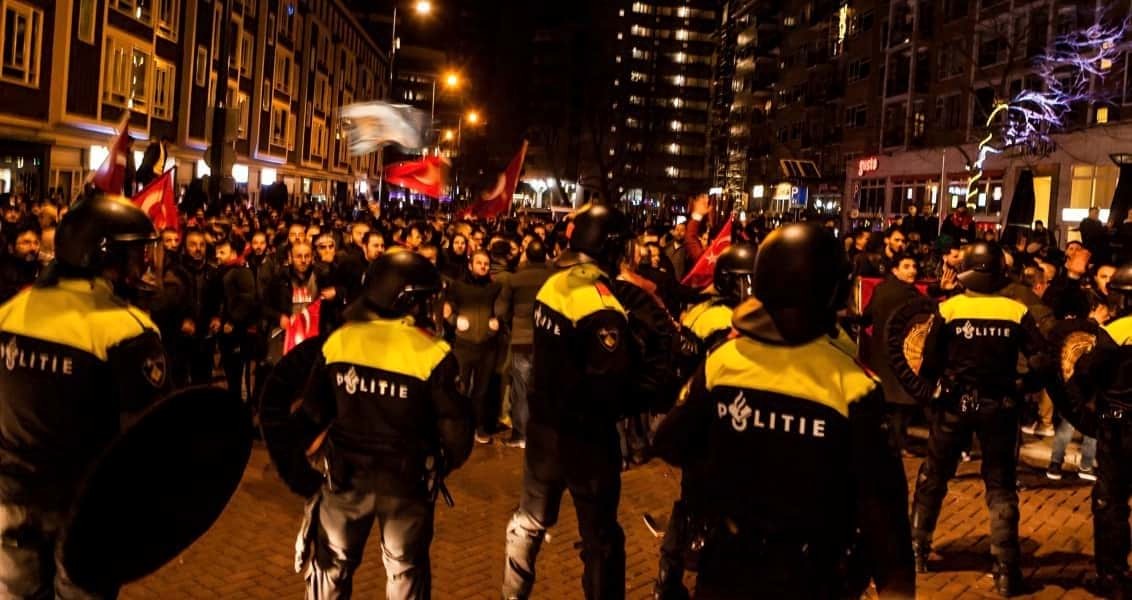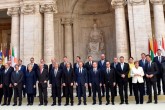Ahead of the April 16 constitutional referendum, European leaders have sided with the “no” campaign to put additional strains on Turkey-EU relations. Ignoring the fact that Turkish politicians made campaign stops in Europe in recent elections, Germany cited security concerns, fire safety hazards and lack of parking space to ban public events hosted by the “yes” campaign. Austria, Sweden and Denmark followed suit. Although the French authorities did not seek to block public appearances by Turkish ministers, presidential candidates Fillon, Macron and Le Pen called for a comprehensive ban. In the Netherlands, where a crucial parliamentary election took place yesterday, the government denied landing rights to Foreign Minister Mevlüt Çavuşoğlu and subsequently detained and deported Family and Social Policies Minister Fatma Betül Sayan Kaya.
The mistreatment of Kaya and peaceful Turkish protesters by the Dutch police cannot be reduced to a pragmatic polarization between the two countries. Imposing a ban on public appearances by cabinet members of a NATO ally and EU candidate country, likewise, cannot be considered an ordinary effort to ensure public safety. Quite the contrary, this is how certain people in Europe choose to raise questions about Turkey’s relationship with the Union and stigmatize the Turkish community. Furthermore, the measures taken by European governments reflect a crisis of identity in the old continent, where a populist wave has been wreaking havoc. Dutch politician Geert Wilders recently described the Turks as “the fifth column,” urged them to leave the Netherlands if their allegiance lay elsewhere and called on the Dutch government to close the borders and abolish the practice of dual citizenship. It is also important to recall that Europe’s current troubles started with the 2008 financial crisis and became more visible when Britain decided to leave the EU and Donald Trump won the U.S. presidential election. Nowadays, we can foresee that the crisis will only deepen as Europe succumbs to right-wing discourse and policies.
More importantly, it would appear that Islamophobia, xenophobia and anti-immigrant sentiments in Europe have started to target Turkey directly. Needless to say, European politicians and institutions, which tapped into anti-Erdoğanism to score political points, are solely responsible for the current situation. They left the Turks alone not only to deal with the negative consequences of the Syrian civil war but also in the fight against terrorist groups including PKK and Gülenist Terror Group (FETÖ). When they looked at the July 15 coup attempt, they saw President Recep Tayyip Erdoğan’s supposed authoritarian turn rather than peaceful resistance in defense of democracy. It was therefore that the Turkish president became a scapegoat for the Western media and far-right extremists alike.
Self-proclaimed European democrats failed to understand that their efforts to undermine Erdoğan as an “Islamist dictator” provided ammunition to anti-Islam and anti-Turkish populism within their borders. They recklessly helped a reactionary wave gain momentum by stigmatizing Turkey. Nowadays, the people riding the same wave are busy fine-tuning an isolationist Europe – by identifying the Turks, which has been largely immune to radicalization, as a public safety hazard.
The earliest signs of this new trend emerged in Britain, where the image of refugees coming from Turkey played into the hands of Brexiteers. The specter of Turkey has since haunted all European governments starting with Germany. Unfortunately, it would appear that the situation is already out of control. With the exception of a carefully-worded call for calm from the Council of Europe, there has been no meaningful reaction to what is happening. I browse through European newspapers in search of warnings about the dangers of alienating Turkey or complaints that telling supporters of Erdoğan to leave Europe is anti-democratic. I look for commentators stressing that the current trend could lead to the expulsion of all Muslims from the continent – a futile endeavor indeed.
[Daily Sabah, March 16, 2017]
In this article
- European Studies
- Opinion
- 2008
- 2017
- Anti-Erdoğanizm
- Anti-Islam
- Anti-Muslim
- Anti-Turkish Sentiment | Anti-Turkism | Turkophobia | Turkish Fear
- Austria
- Avrupa
- Brexit
- Britain
- Civil War
- Daily Sabah
- Denmark
- Donald Trump
- Dutch
- Elections
- Emmanuel Macron
- Europe
- European Union (EU)
- Far-Right
- Fethullah Gülen
- Fethullah Terrorist Organization (FETÖ)
- Fight Against Terror
- Foreign Minister
- French President
- Germany
- Gulen Community
- Gülen Movement
- Gülenist Terror Group
- Gülenist Terror Organization
- Hizmet Movement
- Hollanda
- Islam
- Islamophobia
- Kurdistan Workers' Party Terrorist Organization (PKK)
- Mevlüt Çavuşoğlu
- Middle East
- Muslim
- NATO
- NATO Ally
- Netherlands
- PKK - YPG - SDF - PYD - YPJ - SDG - HBDH - HPG - KCK - PJAK - TAK - YBŞ
- Racism
- Recep Tayyip Erdoğan
- Sweden
- Syria
- Syrian Civil War
- Syrian Conflict
- Syrian Crisis
- Terror
- The President of the Republic of Türkiye
- Turkish Foreign Minister
- Turkish President
- Türkiye
- UK
- United Kingdom (UK)
- United States (US)
- US President
- Western Media
- Western World
- Xenophobia



